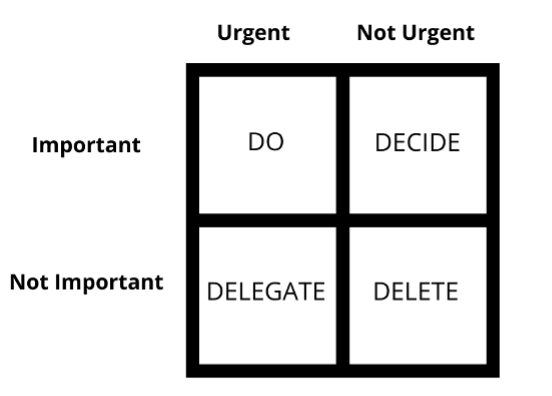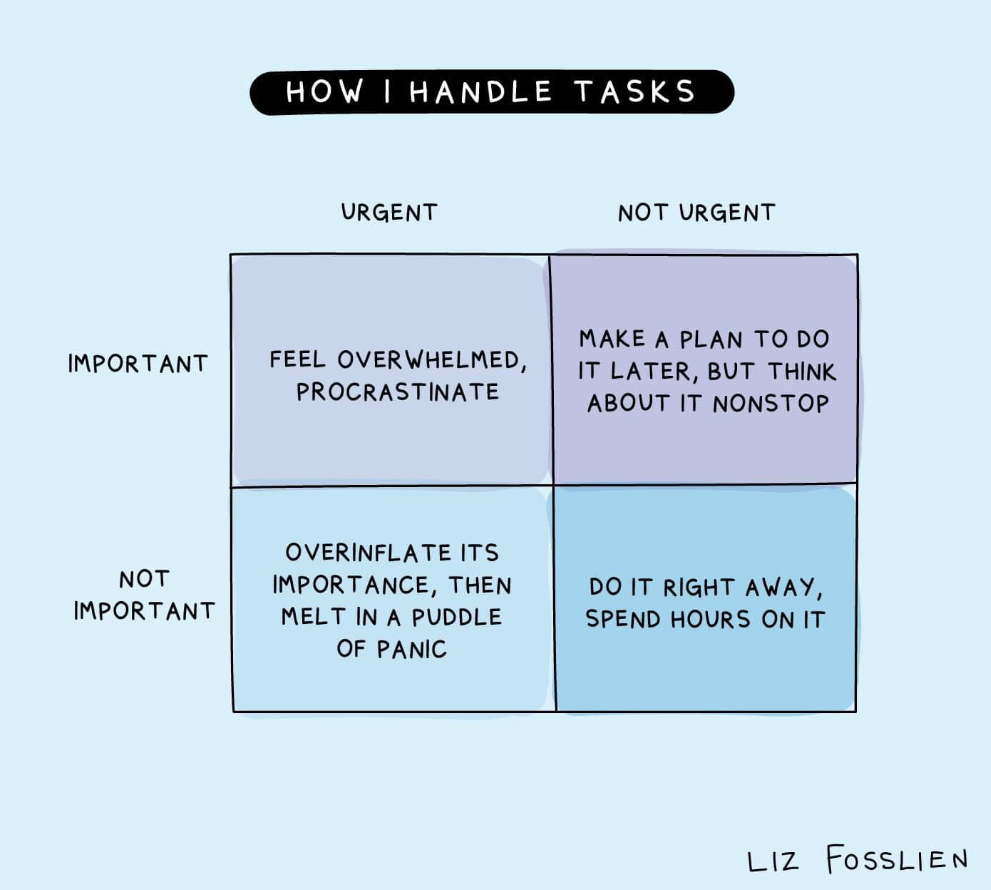
As a small business owner, does it feel like you’re constantly racing against the clock? You’re not alone. Time management is one of the biggest challenges entrepreneurs face. Let’s dive into some strategies to help you make the most of your precious hours, with a special focus on how peer accountability can be your secret weapon.
The Time Crunch is Real
If you’ve ever caught yourself saying:
– “I’m behind before I even show up each morning”
– “I spend most of my day putting out fires”
– “I’m too busy to get involved in an accountability group”
Then welcome to the club! I hear this sort of thing every time I am working with small business owners. In fact, according to data from Microsoft, many of us “spend the equivalent of two workdays a week in meetings and on email.” That doesn’t leave much time for actually running your business, does it?
The Eisenhower Matrix: Ideal vs. Reality
We all know we should be prioritizing our tasks using something like the Eisenhower Matrix, focusing on what’s important rather than just urgent. But for most of us, it feels like everything falls into the “Urgent and Important” quadrant. The result? We’re constantly in reactive mode, never finding time for the strategic work that could really move our businesses forward.


Credit: https://www.fosslien.com/images#/liz-fosslien-funny-eisenhower-matrix
Tracking Your Time: The Eye-Opening Exercise
One powerful way to start getting a handle on your time is to track it. One Harvard Business Review articlesuggests tracking your time for 30 days. That might seem like a bit much, but the insights can be eye-opening. You might discover you’re spending far more time on certain tasks than you realized, or that your most productive hours aren’t when you thought they were. Start by just tracking your time for one day – or one week – and see what stands out.
The Power of Doing Less
It might sound counterintuitive, but sometimes the key to achieving more is actually doing less. The Strategic Coach concept of “Free Days” encourages entrepreneurs to completely unplug from work regularly. This isn’t just about relaxation – it’s about giving your brain the space it needs to think strategically and creatively about your business. I have found that when I walk away from my office, even just for a walk with my dog, I gain new perspectives that somehow don’t present themselves when I’m sitting in my office. And taking a day – or half a day – away from your usual ‘grind’ can give you a completely new perspective on what matters and how to spend your time.
Habits: Your Time Management Superpower
Developing good habits can be a game-changer for time management. As James Clear points out in “Atomic Habits”, small, consistent changes can lead to remarkable results. Whether it’s setting aside time each week for planning, or establishing a morning routine that sets you up for a productive day, good habits can help you reclaim your time. I am a huge fan of habit-setting, including the concept of “habit stacking” – or attaching a new, desired habit to one already in place. What are you already doing (that you enjoy) that you can use to help you add a new routine to your daily schedule?
The Secret Weapon: Peer Accountability Groups
Want to get really serious about making progress? All these strategies are great, but implementing them consistently is the real challenge. That’s where peer accountability groups come in.
Sometimes what you can’t do on your own can be better managed with your peers. Here’s why:
- Goal Setting: Your peers can help you set realistic, achievable goals for the tasks you can’t quite seem to get to.
- Accountability: Knowing you’ll have to report back to the group can be a powerful motivator to stick to your plans.
- Shared Wisdom: Other business owners may have strategies you haven’t thought of, or solutions to challenges you’re facing.
- Support: Sometimes, just knowing you’re not alone in your struggles can be incredibly reassuring.
- Celebration: Your peers will be there to celebrate your wins, no matter how small they might seem.
Consider reaching out to some of your peers to see if they have any interest in putting an accountability group together – or look for an existing group to join.
Making It Work: The 15-Minute Method
With or without your peers, one effective approach is to break your goals down into very small pieces – tasks you can accomplish in just 15 minutes. Then, commit to working on these tasks between meetings and your other daily responsibilities. You might be surprised at how much progress you can make with this approach.
For example, in just 15 minutes, you could:
- Draft a job description that you’ve been putting off for a new hire
- Create a week’s worth of social media posts
- Have a quick check-in with a key employee
- Brainstorm new blog post topics for outreach
- Check in with a top customer for a friendly chat
The Ripple Effect
As you start to get a handle on your time management, you’ll likely find it has a ripple effect on your entire business. You’ll have more time for strategic thinking, for developing your team, for innovation – all the things that can help your business grow and thrive.
Remember, effective time management isn’t about squeezing more tasks into your day. It’s about making sure you’re spending your time on the right tasks – the ones that will move your business forward.
And you don’t have to do it alone. Find your tribe of fellow business owners, commit to supporting each other, and watch as you all start to master the art of time management. After all, time might be your most precious resource – but your peers could be your most valuable asset.


